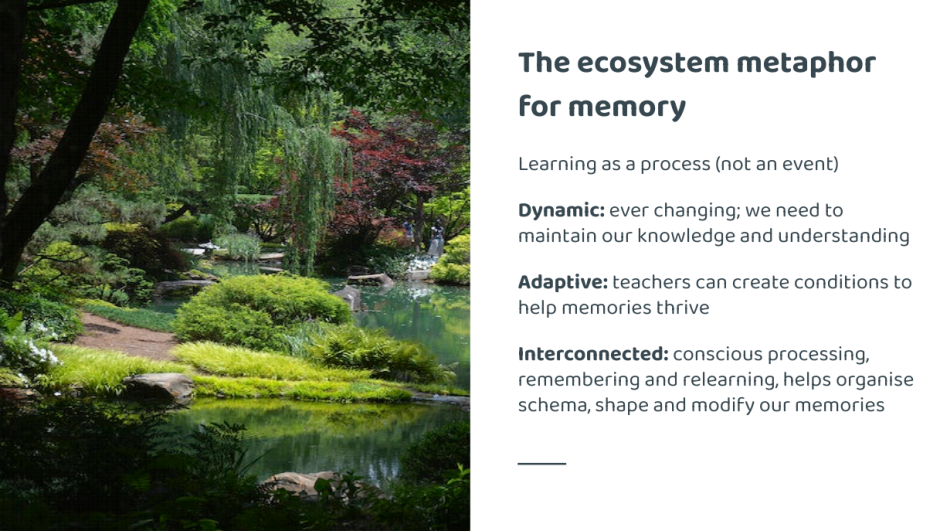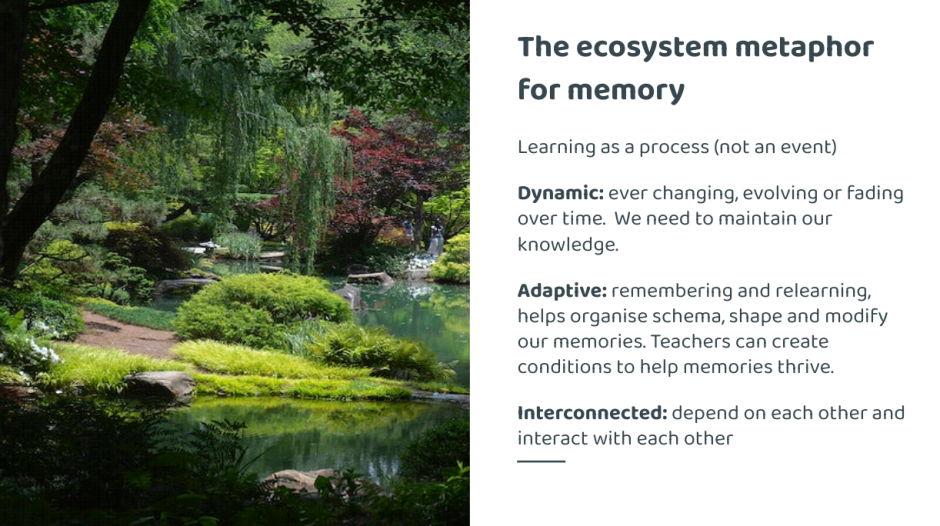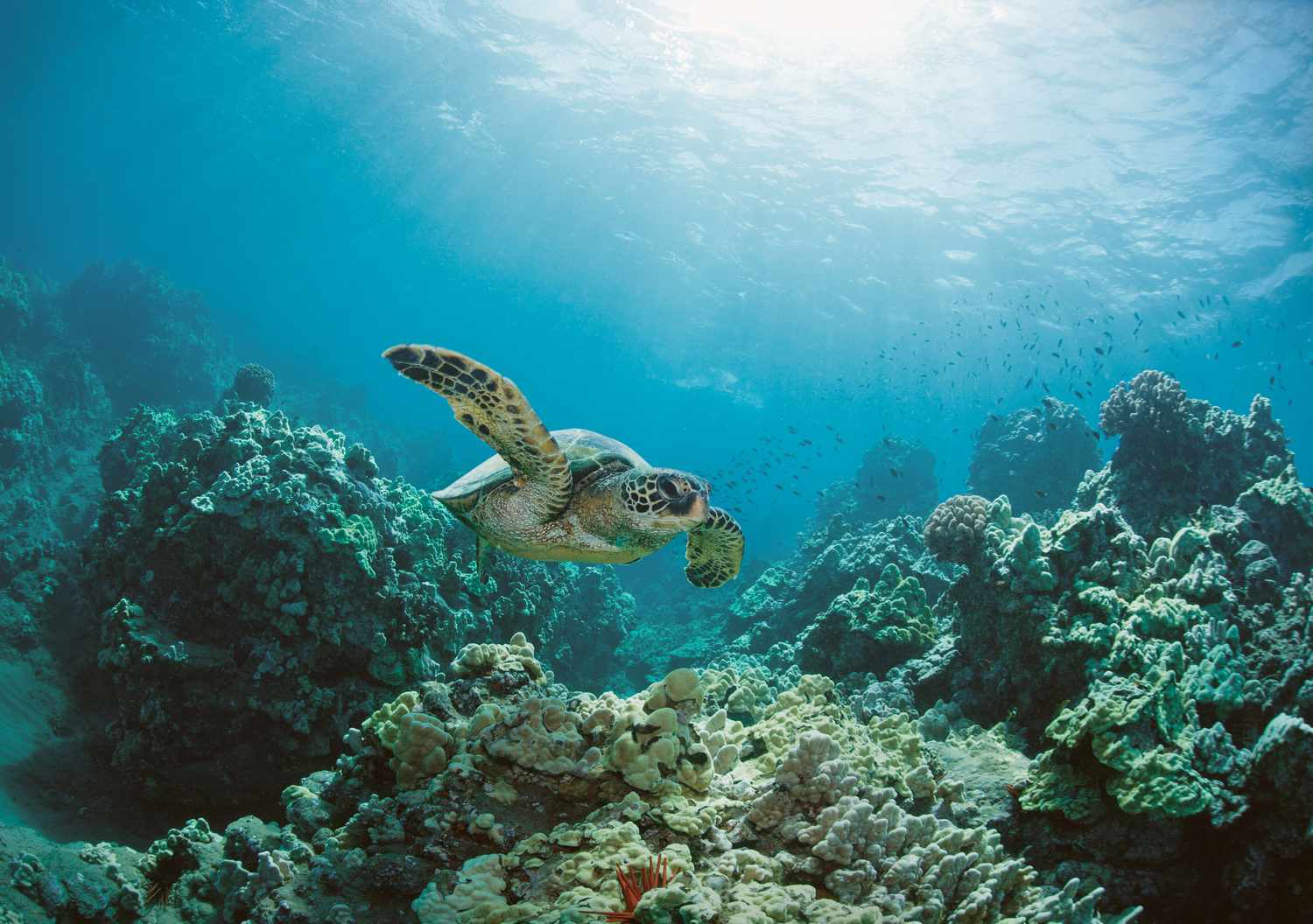
Following the excellent TTCT PD event, I posted the above slide on the metaphorical reference of memory as an ecosystem, as opposed to a library, and received two very interesting responses. Before I go further, I should say that the metaphor has been used before, Tom Sherrington’s used the ‘rainforest,’ and this slide was adapted from the ever-generous Sarah Cottingham @overpractised.
Are you able to elaborate at present?
Richard Dare @dare_richard
Yes, it’s very interesting. However, I think the problem may be that most people won’t have that conceptions of ecosystems. Their ever changing and ever adapting nature, I mean.
Christian Moore-Anderson @CMooreAnderson
Let’s deal with the second very valid response first as I had not gone beyond a superficial or generalistic understanding.
An ecosystem is home to a wide variety of different living things: plants, animals, and microorganisms, animals, and other living things that live together and depend on each other for survival. All living things in an ecosystem have a role to play and work together to keep things in balance. The is both growth and decomposition.
- Biodiverse – Ecosystems are home to a wide variety of different living things: plants, animals, and microorganisms.
- Our memory (long-term) is home to different memories, and schemas, of varying weight and configuration (Factual, Conceptual, Procedural and Metacognitive).
- Interdependence – Living things in an ecosystem depend on each other to survive.
- Memories are interdependent. Memories interact with each other and can influence each other.
- Energy Flow: All living things require energy, which passes through the ecosystem from sunlight to plants, to animals, and finally to decomposers.
- Memory is all about conserving energy. Memories require maintenance, without use and re-use, memories decompose.
- Cycling of Matter: The notion that nutrients (water and carbon dioxide) are constantly cycled through the ecosystem.
- If memories are to accessible must be remembered and maintained. If inaccessible, relearned. (Even then relearning is far more efficient than the original encoding-retrieval). Second, memories or prior knowledge serves the encoding/learning of new knowledge.
- Adaptation: Organisms in an ecosystem are adapted to their environment and evolve over time.
- Using our memories shapes and modifies our memories.
- Dynamic Balance: Ecosystems are always changing, but they tend to maintain a state of balance and stability over time
- Some memories are prioritised and stabilised whereas others decompose and are ‘forgotten’ or inhibited. Forgetting is a part of the dynamic and provides to some degree the balance.
- Human Impact: Human activities, can have a significant impact on ecosystems.
- Teachers can have a significant impact on what is prioritised.
The metaphor of memory as an ecosystem highlights the dynamic, adaptive, and interconnected nature of our memories.
Like an ecosystem, our ‘memory system’ is dynamic. Memories are constantly changing, evolving or fading over time, or being remembered or relearned. Forgetting is very much a part of remembering and each time a memory is retrieved, it is not only strengthened, it may also be altered based on our current context, emotions and as a result of what we have learnt since the first time we encoded-retrieved the original memory.
Our ‘memory system’ is also adaptive, using our memory, shapes our memory. Just as organisms in an ecosystem adapt to their environment over time, our memory system adapts to new information and experiences, forming new connections and associations between and within knowledge schema. In fact what we learn, also directs what we perceive and attend to thereafter.
In that way, our ‘memory system’ is also interconnected. Just as organisms in an ecosystem depend on each other and interact with each other, memories interact with each other, are interconnected and can influence each other. (Remembering a particular smell may trigger memories of a specific event. Remembering a key piece of knowledge, may trigger those key points from a lesson (or not)).
Overall, the metaphor of memory as an ecosystem emphasises the complexity and interconnectedness of our ‘memory system,’ which is dynamic and adaptive, constantly changing and evolving over time.
In that sense, learning is a process (not a product).
Unsurprisingly, the thinking above resulted in an updated slide and the need to revisit “the ecosystem metaphor for memory” conversation with Sarah Cottingham and ask Richard and Christian for comment.





Pingback: Ecosystems and the Red Queen – Edventures